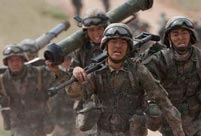

HONG KONG, June 17-- China's Hong Kong Special Administrative Region (SAR) government on Wednesday officially moved a motion concerning the amendment to the method for the selection of the chief executive in 2017 to the Legislative Council (LegCo) for debate.
At the LegCo meeting, Secretary for Constitutional and Mainland Affairs Raymond Tam tabled the proposed method by universal suffrage which allows about 5 million eligible Hong Kong voters to have a say in choosing their next leader.
All 70 LegCo lawmakers are debating on the motion by taking the floor in turn and they are expected to decide whether to endorse the motion by an open ballot voting later.
Chief Secretary Carrie Lam and Secretary for Justice Rimsky Yuen also attended the LegCo meeting, urging LegCo lawmakers to support the motion.
"Hong Kong residents are eagerly looking forward to realizing universal suffrage. If the motion could be endorsed by the Legislative Council, we would finish the third step of Hong Kong's constitutional reform," Tam told the lawmakers.
According to a decision by the Standing Committee of the National People's Congress, China's top legislature, Hong Kong's constitutional reform, amending the method of selection of the chief executive and the method of the formation of the Legislative Council, should go through a five-step legislative procedure.
According to the five-step procedure, the proposed universal suffrage must be endorsed by at least two-thirds of all LegCo members, or at least 47 LegCo members, before Chief Executive Leung Chun-ying gives his consent and China's top legislature gives final approval subsequently.
After the legislative procedure, a 1,200-member nominating committee will select two to three candidates for all eligible voters who then elect the next chief executive in 2017 through " one person, one vote" using a first-past-the-post system.
If the motion is vetoed, the next chief executive will be chosen by a 1,200-member electing committee, the same way as how incumbent Chief Executive Leung Chun-ying was elected in 2012.
"Today is a critical day for the democratic development in Hong Kong. The government has made every effort to develop an open, impartial, fair and competitive system for the chief executive election," said Chief Secretary Lam when addressing the LegCo meeting.
She said that realizing universal suffrage for the region's chief executive will be a historic progress in the region's constitutional development. It will meet the residents' demand and it is the prerequisite to elect the LegCo lawmakers through the same method.
Various polls conducted in Hong Kong have shown that the majority of local people support the universal suffrage proposal offered by the SAR government.
The Alliance for Peace and Democracy has collected more than 1. 2 million signatures in its "sign for universal suffrage movement" in different districts of Hong Kong.
Nearly 1,000 local residents gathered in front of the LegCo complex on Wednesday, holding banners to support the universal suffrage proposal.
Before being handed over to China in 1997, Hong Kong was ruled by Britain for a total of 155 years during which local people never had a chance to choose their own leader in a democratic way.
Under the principle of "One Country, Two Systems," the Hong Kong Basic Law and China's top legislature's relevant decisions empower the region to realize the election of its top leader by universal suffrage.
For his part, Secretary Yuen said at the meeting that as China' s special administrative region, the universal suffrage for the Hong Kong's chief executive must implement the principle of "One country, two Systems" and must be in line with the Hong Kong Basic Law and the relevant explanations and decisions of the top legislature.
The universal suffrage proposal is the most democratic election plan in Hong Kong's history, said Starry Lee, a LegCo member from the pro-establishment camp.
"If the LegCo endorses the motion, it will make history," said Lee who is also the chairperson of the biggest local political organ Democratic Alliance for the Betterment and Progress of Hong Kong.
Regina Ip, a LegCo member who is also the chairperson of the New People's Party, called on the opposition lawmakers to change their minds and support the motion.
"The central government has shown its sincerity and determination to promote universal suffrage in Hong Kong," said Ip.
Andrew Leung, a LegCo member and also chairman of the Business and Professionals Alliance for Hong Kong, also urged the opposition lawmakers to support the motion for the sake of Hong Kong's long-term interests.
 Chinese students learn Duanwu customs in Hefei, Anhui
Chinese students learn Duanwu customs in Hefei, Anhui Abandoned village swallowed by nature
Abandoned village swallowed by nature Graduation: the time to show beauty in strength
Graduation: the time to show beauty in strength School life of students in a military college
School life of students in a military college Top 16 Chinese cities with the best air quality in 2014
Top 16 Chinese cities with the best air quality in 2014 Mysterious “sky road” in Mount Dawagengzha
Mysterious “sky road” in Mount Dawagengzha Students with Weifang Medical University take graduation photos
Students with Weifang Medical University take graduation photos PLA soldiers conduct 10-kilometer long range raid
PLA soldiers conduct 10-kilometer long range raid Stars who aced national exams
Stars who aced national exams
 New PLA campaign targets new recruits
New PLA campaign targets new recruits Island construction can benefit wider region
Island construction can benefit wider region Market studies
Market studies Zen harvest for Shaolin monks
Zen harvest for Shaolin monksDay|Week